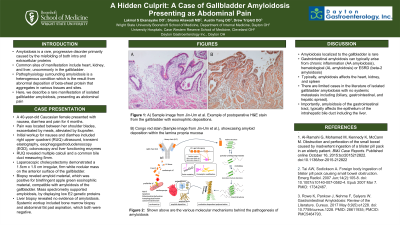Tuesday Poster Session
Category: Stomach
P4216 - A Hidden Culprit: A Case of Gallbladder Amyloidosis Presenting as Abdominal Pain
Tuesday, October 24, 2023
10:30 AM - 4:00 PM PT
Location: Exhibit Hall

Has Audio

Lakmal Ekanayake, DO
Wright State University
Dayton, OH
Presenting Author(s)
Lakmal Ekanayake, DO1, Shaina Ailawadi, MD2, Erin Currey, MD3, Drew Triplett, DO4
1Wright State University, Dayton, OH; 2University Hospitals, Cleveland, OH; 3Wright State University Boonshoft School of Medicine, Fairborn, OH; 4Dayton Gatroenterology, Dayton, OH
Introduction: Amyloidosis is a rare, progressive disorder primarily caused by the misfolding of both intracellular and extracellular proteins. Amyloidosis typically manifests as varied systemic findings; however, approximately 10% of the cases are localized to single organs.1 Common sites of amyloidosis include the heart, kidney, and liver. In our case, we describe a rare finding of isolated gallbladder amyloidosis without any systemic involvement presenting as abdominal pain.
Case Description/Methods: A 40-year-old Caucasian female presented with abdominal pain, nausea, diarrhea, and pain between her shoulder blades for four months. The pain worsened in the upper back after meals and subsided with ibuprofen. Significant symptoms included nausea and diarrhea three times per day for four months. Past medical history significant for non-alcoholic steatohepatitis (NASH) and type 2 diabetes mellitus. Initial workup for nausea and diarrhea included right upper quadrant (RUQ) ultrasound, transient elastography, esophagogastroduodenoscopy (EGD), colonoscopy and liver functioning enzymes.
RUQ revealed multiple calculi and a common bile duct measuring 5mm. Laparoscopic cholecystectomy demonstrated a 1.5cm x 1.5 cm irregular, firm white nodular mass on the anterior surface of the gallbladder. Biopsy revealed amyloid material, which was positive for birefringent apple green eosinophilic material, compatible with amyloidosis of the gallbladder. Mass spectrometry supported amyloidosis by displaying low E2 genetic proteins. Liver biopsy revealed no evidence of amyloidosis. Systemic workup included bone marrow biopsy and abdominal fat pad aspiration, which were both negative. At a two-month follow-up, the patient’s diarrhea and pain had resolved
Discussion: Amyloidosis localized to the gallbladder without systemic involvement is a rare finding with very limited reports in the literature with no known cases of isolated gallbladder amyloidosis found in a murine model. Typically, amyloidosis affects the heart, kidney, and spleen with rare instances of amyloidosis of the gastrointestinal tract localizing to the epithelium of the intrahepatic bile duct including the liver parenchyma2. Through virtue of this case, we encourage clinicians to consider and report rare manifestations of amyloidosis in the gastrointestinal tract.
Disclosures:
Lakmal Ekanayake, DO1, Shaina Ailawadi, MD2, Erin Currey, MD3, Drew Triplett, DO4. P4216 - A Hidden Culprit: A Case of Gallbladder Amyloidosis Presenting as Abdominal Pain, ACG 2023 Annual Scientific Meeting Abstracts. Vancouver, BC, Canada: American College of Gastroenterology.
1Wright State University, Dayton, OH; 2University Hospitals, Cleveland, OH; 3Wright State University Boonshoft School of Medicine, Fairborn, OH; 4Dayton Gatroenterology, Dayton, OH
Introduction: Amyloidosis is a rare, progressive disorder primarily caused by the misfolding of both intracellular and extracellular proteins. Amyloidosis typically manifests as varied systemic findings; however, approximately 10% of the cases are localized to single organs.1 Common sites of amyloidosis include the heart, kidney, and liver. In our case, we describe a rare finding of isolated gallbladder amyloidosis without any systemic involvement presenting as abdominal pain.
Case Description/Methods: A 40-year-old Caucasian female presented with abdominal pain, nausea, diarrhea, and pain between her shoulder blades for four months. The pain worsened in the upper back after meals and subsided with ibuprofen. Significant symptoms included nausea and diarrhea three times per day for four months. Past medical history significant for non-alcoholic steatohepatitis (NASH) and type 2 diabetes mellitus. Initial workup for nausea and diarrhea included right upper quadrant (RUQ) ultrasound, transient elastography, esophagogastroduodenoscopy (EGD), colonoscopy and liver functioning enzymes.
RUQ revealed multiple calculi and a common bile duct measuring 5mm. Laparoscopic cholecystectomy demonstrated a 1.5cm x 1.5 cm irregular, firm white nodular mass on the anterior surface of the gallbladder. Biopsy revealed amyloid material, which was positive for birefringent apple green eosinophilic material, compatible with amyloidosis of the gallbladder. Mass spectrometry supported amyloidosis by displaying low E2 genetic proteins. Liver biopsy revealed no evidence of amyloidosis. Systemic workup included bone marrow biopsy and abdominal fat pad aspiration, which were both negative. At a two-month follow-up, the patient’s diarrhea and pain had resolved
Discussion: Amyloidosis localized to the gallbladder without systemic involvement is a rare finding with very limited reports in the literature with no known cases of isolated gallbladder amyloidosis found in a murine model. Typically, amyloidosis affects the heart, kidney, and spleen with rare instances of amyloidosis of the gastrointestinal tract localizing to the epithelium of the intrahepatic bile duct including the liver parenchyma2. Through virtue of this case, we encourage clinicians to consider and report rare manifestations of amyloidosis in the gastrointestinal tract.
Disclosures:
Lakmal Ekanayake indicated no relevant financial relationships.
Shaina Ailawadi indicated no relevant financial relationships.
Erin Currey indicated no relevant financial relationships.
Drew Triplett indicated no relevant financial relationships.
Lakmal Ekanayake, DO1, Shaina Ailawadi, MD2, Erin Currey, MD3, Drew Triplett, DO4. P4216 - A Hidden Culprit: A Case of Gallbladder Amyloidosis Presenting as Abdominal Pain, ACG 2023 Annual Scientific Meeting Abstracts. Vancouver, BC, Canada: American College of Gastroenterology.
